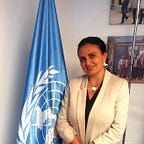Masters of their own destinies
How the joint UN Programme for Rural Women’s Economic Empowerment enables rural women around the globe to overcome challenges
Meet Tadelech Bekelpe, a 38-year-old widowed mother from Ethiopia. After her husband’s death, she faced the rough challenge of taking care of her seven children. The family was already struggling to make ends meet when the father was alive. However, a few years ago, Tadelech had the opportunity to provide for her family through a small loan. Today, she is the owner of a small shop in her village.
Zamira Davletbakova is a 40-year-old mother of three from Kyrgyzstan. In the past four years, she went from being a housewife to becoming a member of her local council. After receiving some leadership training, she became equipped to play a bigger role, not only within her own family, but also within her community.
Thirty-six-year-old Liberian mother Mari Kpadeh is the leader of the Arbleejay farming group. She used to struggle handling the activities of her group but training on organizational management and leadership skills enabled her not only to manage her group better but also to obtain access to markets and financial resources.
Tadelech, Zamira and Mari are three different women from three different parts of the world. But they have one thing in common: they are successful participants in the Joint Programme on “Accelerating Progress towards the Economic Empowerment of Rural Women” (JP RWEE). The JP RWEE is a unique UN initiative implemented by the World Food Programme (WFP) with the Food and Agriculture Organization of the United Nations (FAO), the International Fund for Agricultural Development (IFAD) and the United Nations Entity for Gender Equality and the Empowerment of Women (UN Women).
The programme benefits 41,000 women and is implemented in seven countries: Ethiopia, Guatemala, Kyrgyzstan, Liberia, Nepal, Niger and Rwanda.
Right: Tadelech Bekelpe from Ethiopia, local entrepreneur Photo:UN Women/Abebe
The success stories of Zamira, Tadelech and Mari were presented by Alia El-Yassir, UN Women Regional Director for Europe and Central Asia, at the opening of the side event on “Rural women’s empowerment for food security and nutrition for all: evidence from joint UN work”, which was held on the sidelines of the 63rd session of the Commission on the Status of Women (CSW) in New York on 14 March, 2019.
In the words of Kawinzi Muiu, WFP’s Director of Gender, the event constituted “a perfect opportunity to exchange points of view and ideas on the lessons learned and success factors from the JP RWEE since it started in 2014.” Positive results have been enhanced by the holistic nature of JP RWEE, which leverages the comparative advantages of the four participating UN agencies. As was highlighted by Dinara Rakhmanova, FAO Assistant Representative in the Kyrgyz Republic, the partnerships built throughout the programme have been central to improving food security and nutrition, increasing income and sustainable livelihoods, enhancing women’s leadership and participation, and bolstering gender-responsive rural development policies.
Ndaya Beltchika, IFAD Lead Technical Specialist on Gender and Social Inclusion, highlighted the potential of engaging methodologies that enable both women and men to visualize and articulate their aspirations as individuals and households. “Beneficiaries realize that they can reach their vision for the future with limited resources and that within the skill sets they already have there are pathways to get out of poverty. It is really a message of hope,” she said.
Evidence from the JPR WEE shows that the impact the empowerment of rural women is having on their families clearly demonstrates that such programmes should be at the core of interventions to achieve a world without hunger.
But what do we mean by empowerment?
“Empowerment has different meanings for different women,” said Susan Kaaria, FAO Senior Gender Officer. “What the JPRWEE does is that it increases women’s autonomy, expands their choices and strengthens their feeling of being respected. All this stimulates wider benefits — for households, communities, and societies at large.”
According to André Mundal, Senior Advisor for Women’s Rights and Gender Equality from the Norwegian Ministry of Foreign Affairs, “Women are not vulnerable because they are women. They are vulnerable because of discriminatory laws, regulations and social norms. This is why it has been so crucial for the JP RWEE to develop solid and efficient partnerships at the local level; partnerships that have allowed to successfully reach out to women and make them realize their potential for social and economic leadership.”
The Lead Policy Advisor for Gender Equality at the Swedish International Development Cooperation Agency (Sida), Eva Johansson, noted that locating such a programme in rural areas is really critical because this is where the needs are and where women and girls require the most support. Ms. Johansson followed up by raising Sida’s commitment to the JP RWEE, announcing Sida’s decision to allocate an additional contribution of over US$ 4 million to the JP RWEE.
“We are all really proud to be part of this programme, and we look forward to continuing our collaboration to make an impact on the lives of these women and their communities,” concluded Kawinzi Muiu.
Please click here for the complete recording of the event.
